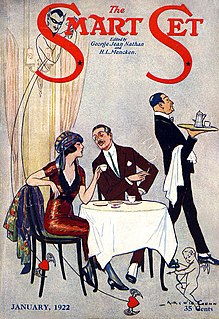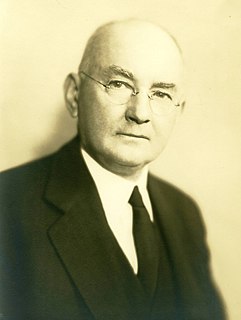
Melville Louis Kossuth "Melvil" Dewey was an influential American librarian and educator, inventor of the Dewey Decimal system of library classification, a founder of the Lake Placid Club, and a chief librarian at Columbia University. He was also a founding member of the American Library Association but resigned in 1905, due to allegations of sexual harassment, racism, and antisemitism.

The University of Louisville (UofL) is a public research university in Louisville, Kentucky. It is part of the Kentucky state university system. When founded in 1798, it was the first city-owned public university in the United States and one of the first universities chartered west of the Allegheny Mountains. The university is mandated by the Kentucky General Assembly to be a "Preeminent Metropolitan Research University". The university enrolls students from 118 of 120 Kentucky counties, all 50 U.S. states, and 116 countries around the world.

The Courier-Journal, also known as the Louisville Courier Journal (and informally The C-J or The Courier), is the highest circulation newspaper in Kentucky. It is owned by Gannett and billed as "Part of the USA Today Network". According to the 1999 Editor & Publisher International Yearbook, the paper is the 48th-largest daily paper in the United States.

Henry Watterson, the son of a U.S. Congressman from Tennessee, became a prominent journalist in Louisville, Kentucky, as well as a Confederate soldier, author and partial term U.S. Congressman. A Democrat like his father Harvey Magee Watterson, Henry Watterson for five decades after the American Civil War was a part-owner and editor of the Louisville Courier-Journal, which founded by Walter Newman Haldeman and would be purchased by Robert Worth Bingham in 1919, who would end the Pulitzer Prize-winning journalist's association with the paper.

The Smart Set was an American literary magazine, founded by Colonel William d'Alton Mann and published from March 1900 to June 1930. Its headquarters was in New York City. During its Jazz Age heyday under the editorship of H. L. Mencken and George Jean Nathan, The Smart Set offered many up-and-coming authors their start and gave them access to a relatively large audience.

The Louisville Free Public Library (LFPL) is the public library system in Louisville, Kentucky and the largest public library system in the U.S. state of Kentucky.
Eric Edward Moon was a librarian and editor who had a shaping influence on American librarianship in the 1960s, 1970s, 1980s, and 1990s as editor-in-chief of Library Journal, president of the American Library Association, and chief editor at Scarecrow Press. Moon was a trailblazer and influential figure instrumental in transforming library professionalism, polity, and social responsibility.

The University of Louisville Louis D. Brandeis School of Law, commonly referred to as The University of Louisville School of Law, U of L Brandeis School of Law, or the Brandeis School of Law, is the law school of the University of Louisville. Established in 1846, it is the oldest law school in Kentucky and the fifth oldest in the country in continuous operation. The law school is named after Justice Louis Dembitz Brandeis, who served on the Supreme Court of the United States and was the school's patron. Following the example of Brandeis, who eventually stopped accepting payment for "public interest" cases, Louis D. Brandeis School of Law was one of the first law schools in the nation to require students to complete public service before graduation.

Earl Gregg Swem was an American historian, bibliographer and librarian. Swem worked at the Library of Congress and Virginia State Library, and for more than two decades was primary librarian at the College of William & Mary, where the Earl Gregg Swem Library was named in his honor.

George Dennison Prentice was a newspaper editor, writer and poet who built the Louisville Journal into a major newspaper in Louisville, Kentucky, and the Ohio River Valley, in part by the virulence and satire in its editorials, which some blamed for a bloody election day riot in 1855. A slaveholder, Prentice initially supported Unionist candidate John Bell in the 1860 U.S. Presidential election, and after the American Civil War he urged Kentucky to remain neutral. Both of his sons joined the Confederate States Army, one dying in 1862, and Prentice's editorials lampooned Kentucky's military governor, Union General Stephen G. Burbridge. Prentice later opposed Congressional Reconstruction. He wrote a biography of Henry Clay published in 1831, an 1836 poem published in the McGuffey Readers, and a collection of his humorous essays was published in 1859 and revised after his death.

Jennie Maas Flexner was a librarian, a suffragist and author.

Louis Round Wilson was an important figure to the field of library science, and is listed in “100 of the most important leaders we had in the 20th century,” an article in the December 1999 issue of American Libraries. The article lists what he did for the field of library science including dean at the University of Chicago Graduate Library School, directing the library at the University of North Carolina/Chapel Hill, and as one of the “internationally oriented library leaders in the U.S. who contributed much of the early history of the International Federation of Library Associations and Institutions.” The Louis Round Wilson Library is named after him.

Frederic Beecher Perkins was an American editor, writer, and librarian. He was a member of the Beecher family, a prominent 19th-century American religious family.

Lewis Craig Humphrey (1875–1927) was a prominent Kentucky newspaper editor who began his journalistic career as a reporter at the Louisville daily newspaper, the Louisville Evening Post, under the supervision of editor and publisher Richard W. Knott. Upon Knott's death, Humphrey became chief editor of the paper.

Paul North Rice was an American librarian who served as Chief of the Reference Department of the New York Public Library, Executive Secretary of the Association of Research Libraries and President of the American Library Association.

Rachel Davis Harris was an American librarian and activist. She was an influential female African American director and children's librarian of the Louisville Free Public Library, Western Colored Branch, one of the first segregated libraries built in the southern United States. She promoted library outreach to youths and equitable access to library services in the black community during the Jim Crow era.
From 1876 to 1913, the Polytechnic Society of Kentucky was an educational, cultural and scientific organization based in downtown Louisville, Kentucky, United States. The creation of the society was to serve as a funding source for the Public Library of Kentucky which had gone bankrupt. The society operated on Fourth Street, inside Library Hall, until 1901.
The Public Library of Kentucky was opened to the public on April 27, 1872 inside the Central Market building in downtown Louisville, Kentucky, United States. The library consisted of thousands of volumes of books, an art gallery and a museum. It was the dream of its founders to build a museum inside the library that would rival the British Museum of the United Kingdom. However, the dream was a con that brought upon a lottery scandal that shocked Louisville and the world.

The Kentucky Library Association (KLA) is a professional organization for Kentucky's librarians and library workers. It is headquartered in Prospect, Kentucky. It was founded on June 28, 1906, in Louisville, Kentucky with 52 charter members. Its original goal was to form a state library commission as well as to increase access to free state documents. William Frederick Yust was elected as the association's first president. The third conference the KLA took part in was a tri-state conference with Ohio and Indiana. In 2011 the KLA held a joint conference with the Kentucky School Media Association in order to work together with librarians on creativity, cooperation, and the impact of change. The KLA became a state chapter of the American Library Association in 1917, and is a member of the Southeastern Library Association. One of the KLA’s daughter organizations, the Kentucky Public Library Association (KPLA), aims to encourage growth of its members, improve library service, and work with other organizations to do so.

James Lyman Whitney was an American librarian who worked at the Boston Public Library from 1869 to 1910. For the majority of his library career, Whitney was the library catalog head from 1874 to 1899. Prior to this position, Whitney held assistant positions for Cincinnati Public Library and Boston Public Library from 1868 to 1874. After his library catalog position, Whitney was the librarian of Boston Public from 1899 to 1903. He then was in charge of the library's documents and statistics section from 1903 until his death in 1910.
















